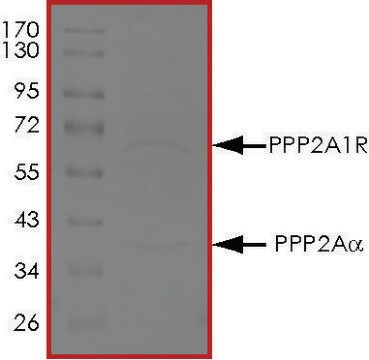17-127
Ser/Thr Phosphatase Assay Kit 1 (K-R-pT-I-R-R)
Ser/Thr Phosphatase Assay Kit 1used to detect PP2A activity by either dephosphorylation of the phosphopeptide.
Synonym(s):
Phosphatase Assay Kit
About This Item
Recommended Products
Quality Level
manufacturer/tradename
Upstate®
technique(s)
activity assay: suitable (phosphatase)
NCBI accession no.
UniProt accession no.
detection method
colorimetric
shipped in
wet ice
Gene Information
human ... PPP2R1B(5519)
Application
Packaging
Components
Malachite Green Additive (Cat.# 20-104)
Phosphate Standard (Cat.# 20-103)
Threonine Phosphopeptide (K-R-pT-I-R-R) (Cat.# 12-219)
pNPP (p-Nitrophenyl Phosphate) (Cat.# 20-106)
pNPP Ser/Thr Assay Buffer (Cat.# 20-179)
NiCl2, 40mM (Cat.# 20-178)
96-well microtiter plate
Quality
Legal Information
Disclaimer
Signal Word
Danger
Hazard Statements
Precautionary Statements
Hazard Classifications
Aquatic Chronic 3 - Carc. 1A Inhalation - Met. Corr. 1 - Repr. 1B - Skin Sens. 1 - STOT RE 2
Target Organs
Lungs
Storage Class Code
6.1C - Combustible acute toxic Cat.3 / toxic compounds or compounds which causing chronic effects
Certificates of Analysis (COA)
Search for Certificates of Analysis (COA) by entering the products Lot/Batch Number. Lot and Batch Numbers can be found on a product’s label following the words ‘Lot’ or ‘Batch’.
Already Own This Product?
Find documentation for the products that you have recently purchased in the Document Library.
Our team of scientists has experience in all areas of research including Life Science, Material Science, Chemical Synthesis, Chromatography, Analytical and many others.
Contact Technical Service








